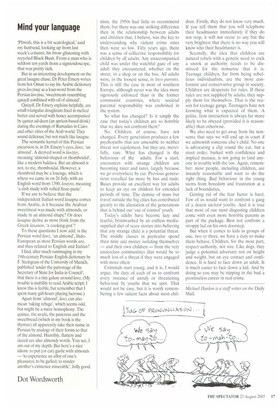Mind your language
Thwuh, this is a bit scatological,' said my husband, looking up from last week's column, his brow glistening with recycled Black Bush. From a man who is seldom ten yards from a sigmoidoscope, that was pretty rich.
But in an interesting development on the great lasagne chase, Dr Peter Emery writes from hot Oman to say his Arabic dictionary gives lawzinaj as a loan-word from the Persian lawzina, 'sweetmeats resembling qatayif combined with oil of almond'.
Qatayif, Dr Emery explains helpfully, are small triangular doughnuts fried in melted butter and served with honey accompanied by qamar ad-deen (an apricot-based drink) during the evenings of Ramadan in Cairo and other cities of the Arab world. They sound delicious, but not much like lasagne.
The semantic kernel of this Persian excursion is, in Dr Emery's eyes, lawz, 'an almond'. A derived word is lawziyy, meaning 'almond-shaped or rhomboidal', like a modern baklava. But an almond is not, to me, rhomboidal. However, a rhomboid may be a lozenge, which is where we came in on 26 July, with an English word from 1390, loseyns, meaning 'a dish made with rolled flour-paste'.
If we are to believe that the independent Italian word lasagna comes from Arabic, is it because the Arabian sweetmeat was made with almonds, or made in an almond shape? Or does lasagna derive as most think from the Greek lasanon, 'a cooking-pot'?
To these questions I now add: is the Persian word lawz, 'an almond', IndoEuropean as most Persian words are, and thus related to English and Italian?
I find, after much rummaging in my 19th-century Persian–English dictionary by F. Steingrass of the University of Munich, published 'under the patronage of the Secretary of State for India in Council', that there is a tiny galaxy around lawz. (My trouble is inability to read Arabic script; I know this is feeble, but remember that I spent many girl-hours playing lacrosse.) Apart from 'almond', lawz can also mean 'taking refuge', which seems odd, but might be a mere homophony. The quince, the uvula, the pancreas and the sweetbread (which in my book is the thymus) all apparently take their name in Persian by analog of their forms to that of the almond. Humility, flattery and deceit are also almondy words. You see, I am out of my depth. But here's a nice idiom: to put (or eat) garlic with almonds — 'to experience an alloy of one's pleasures; to be gulled; to render another's existence miserable'. Jolly good.
Dot Wordsworth


























































 Previous page
Previous page